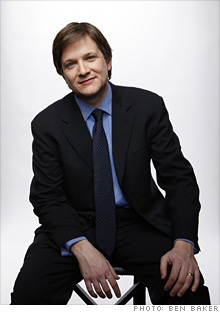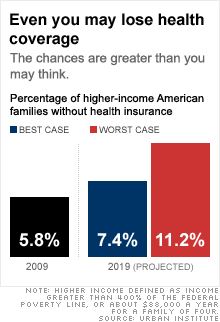Focus on the real health-care risks
Good investors anticipate danger and protect against it. The country has to do the same thing with the health-care system.
 |
| Pat Regnier |

(Money Magazine) -- Regular readers of Money Magazine have learned to think a lot about risk. You know that you can't predict every market crash, but you can take steps to lower your exposure to the unexpected. The health-care reform debate we're having in this country happens to be largely about risk.
But we've been talking -- and sometimes shouting -- an awful lot about one particularly vivid risk and not focusing nearly enough on two other big ones. Let's take a closer look at all three.
On a hot night in August, I attended a standing-room-only town-hall meeting run by Tom Perriello, a Democratic congressman from Virginia. Plenty of reform supporters showed up. But Perriello also got an earful from constituents who just don't trust the government with health care.
It's not crazy to worry that the bright bureaucrats with big ideas could end up designing a worse health system. But don't worry too much. Our current setup is hardly a finely tuned machine. Yes, many Americans have short wait times for cutting-edge cures, but overall health is spotty. A study in the journal Health Affairs looked at deaths from ailments that good medicine could fix. The U.S. ranked at the bottom (that is, the most deaths) among rich nations. And we're the only such nation that doesn't insure everybody.
That's actually part of the problem: The people with good coverage aren't very sensitive to the price of their care. That pushes total costs up, making insurance more expensive and, over time, causing more and more people to lose it (see the chart at right).
True, the uninsured will continue to be in the minority over the next decade. But when you plan your investments, you don't try to protect yourself from what's most likely to happen. You protect against what could happen. I'm not sure if losing your coverage is more or less likely than seeing another 50% drop in the S&P 500. But it's potentially more catastrophic and harder to defend against. There is no safety net.
Many experts think Medicare can't be fixed in isolation. "The Medicare program just buys health care in the regular health-care system," points out economist Len Nichols of the New America Foundation. An overall reform that covers everyone while making the whole system more efficient could slow the growth of Medicare costs, lowering the risk of future benefit cuts.
Taking concrete steps today to head off major risks later isn't easy. But many families have learned how. It's called financial planning. No matter where you come down on Obamacare, we as a country have to start doing some too.
![]()


